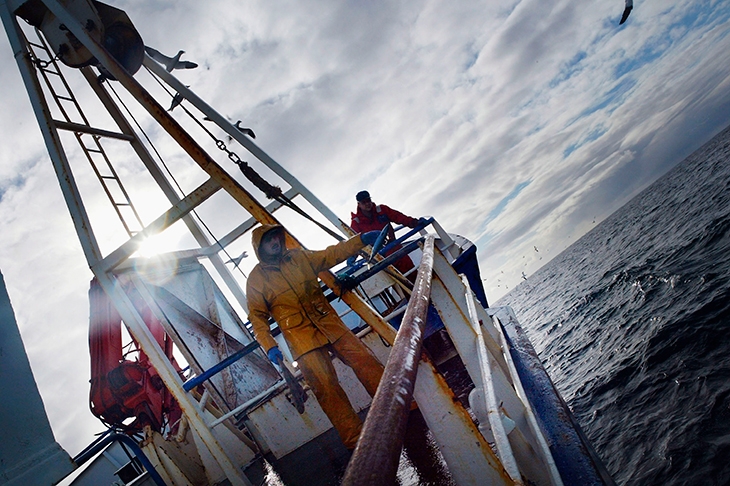‘Every country has a political problem with its fishermen,’ wrote Peter Walker, the Conservative minister who negotiated the first effective EU-UK fishing deal in 1983. ‘Everyone sympathises with the tough life they lead. They all want to take as much fish as they can.’ And here’s Michel Barnier, still speaking as the EU’s chief Brexit negotiator in Dublin last week despite rumours he’s about to be sidelined: ‘Without a long-term, fair and sustainable solution on fisheries, there will simply be no new economic partnership with the UK.’
Those quotes encapsulate the bizarre fact that an industry which contributes just £1.4 billion to UK GDP stands, alongside the Northern Ireland border issue, as a last obstacle to a sensible Brexit divorce. More than half the catch in UK waters is taken by non-UK vessels — claiming ancient rights that pre-date the EU — and more than half of EU fish quotas for England and Wales have been sold to foreign operators, while most of the fish we eat is imported and most of what we still catch is exported to Europe. The pragmatic solution must be a continuing year-by-year quota fight that gradually shifts the status quo in favour of a revived UK fleet — rather than slammed doors and naval skirmishes.
But if the Prime Minister and Lord Frost really want to wreck the Withdrawal Agreement, they probably think ‘taking back control of our waters’ will win public support. And if it does nothing for the prosperity of our fishermen or wider prospects for UK-EU trade? That’s politics for you.
Toxic speculator
What is Softbank — and what mischief has it been up to? The first part of the answer is that this Japanese name-to-conjure-with, founded by Masayoshi Son in 1981, is not a bank but a tech investor that has grown up to be Japan’s second most valuable company after Toyota. It’s the company that bought the UK’s smartest digital venture, Cambridge-based chip designer Arm Holdings, for $32 billion in 2016, and that lost most of a $10 billion stake in WeWork, the shared-workspace provider that imploded last year; it was also a backer of Wirecard, the collapsed German payments business.
And now it is revealed as the buyer of huge volumes of share options in US technology firms listed on the Nasdaq exchange, helping to drive that market’s index up by 76 per cent since March before a dive last week. Softbank’s own shares fell by 7 per cent in Tokyo on Monday as investors awoke to the risk of a multibillion-dollar bet that shares in the likes of Tesla and Apple will continue to rise. Observers fear such gambling fuels volatility in a market whose values seem to have lost touch with reality — Apple alone is notionally worth more than all the FTSE100. And old Japan hands like me recall a word coined in the 1980s when Masayoshi Son was young: zaiteku, which meant toxic speculation designed to disguise lacklustre underlying performance.
Steely champion
Lady Judge, the American-born former chair of the Institute of Directors, the UK Atomic Energy Authority and much else besides, who has died aged 73, was the Arya Stark of British boardrooms: petite, steely, not one to pick a fight with. She was also, said theFT’s obituary, ‘a tireless advocate for women’s rights’, who broke barriers in several male-dominated sectors and encouraged other women to follow.
This column has done its best to support that cause, particularly in advancing the view that senior female bankers (the likes of Alison Rose of NatWest and Ana Patricia Botín of Santander) often turn out to be safer hands than their macho peers. If that sounds like stereotyping, I refer to another recent FT piece drawing on a Goldman Sachs analysis of almost 500 US equity funds and headlined ‘Female-managed funds beat all-male rivals’.
Still today only five FTSE100 chief executives are female. But on a broader tally of top corporate jobs, the proportion has risen to between a fifth and a third. And that’s real progress if we consider the evidence of my own obituary oeuvre — a 1,000-piece jigsaw of modern business history that illuminates what a fusty old men’s club this milieu used to be. It’s an awkward fact that in all these years I have only ever written the life stories of a dozen businesswomen. I salute Barbara Judge for wielding her sword.
North of the Border
As I crossed the Scottish border I half-expected a roadblock manned by Nicola Sturgeon with a bucket of sanitiser. The First Minister’s high approval ratings during the pandemic have encouraged her push for ‘Indyref 2’ — as James Forsyth wrote last week — despite the dire state of the Scottish economy. Having declined to follow Westminster’s line and urge Scots back to work, it must be galling for her that one of their few current sources of positive cashflow is yet another subsidy from the south: spending by English visitors who love her country despite her politics.
Boris Johnson set the trend with his rented croft in Wester Ross. As for me, I was heading for a fine bed-and-breakfast called Chipperkyle run by a friend near Dumfries — and I sensed a convoy of Spectatorreaders behind me. A fishing party commended the Oykel Bridge Hotel in the wilderness of Sutherland, with lunch at Luigi’s in Dornoch en route. An actor told me he likes Glasgow so much, despite renewed lockdown, that he’s staying on to make a life there. A golfer reported from Trump Turnberry that breakfast under ‘Ivanka’s chandeliers’ is overpriced, better value being found at Wildings restaurant up the road.
More galling still for Nicola must be the thought that her most enthusiastic inward investor — with £150 million spent at Turnberry and his controversial ‘£1 billion golf resort’ project in Aberdeenshire — is a politician whose persona offends her even more than Johnson’s does.
Got something to add? Join the discussion and comment below.
Get 10 issues for just $10
Subscribe to The Spectator Australia today for the next 10 magazine issues, plus full online access, for just $10.
You might disagree with half of it, but you’ll enjoy reading all of it. Try your first month for free, then just $2 a week for the remainder of your first year.















Comments
Don't miss out
Join the conversation with other Spectator Australia readers. Subscribe to leave a comment.
SUBSCRIBEAlready a subscriber? Log in